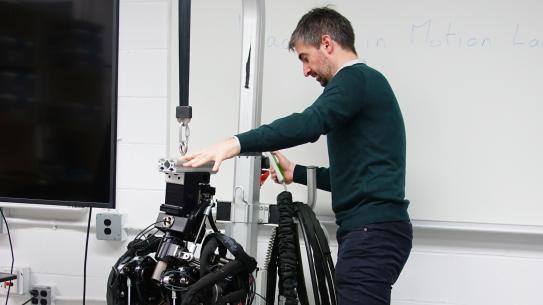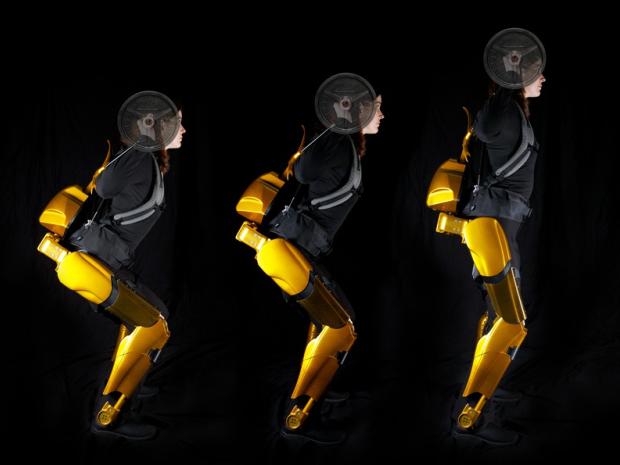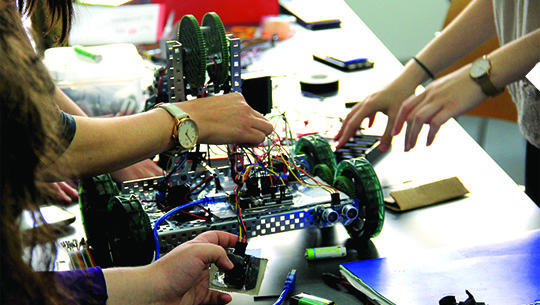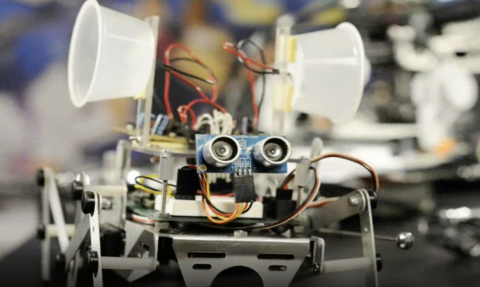

At NYU, we believe that robotics has a central role to play in future urban environments and the improvement of human life, from mobility to healthcare, from infrastructure management to the service industry.

Robotics research and education at NYU focuses on developing and teaching the fundamental principles, theories, and algorithms for autonomous intelligent machines. Through our research and education, we aim to enhance mobility, service, infrastructure, and healthcare. Our mission is to carry out fundamental and multidisciplinary research to advance the science of robotics, to educate and mentor students in the theory and practice of robotics, and to make a positive impact on society.


The Robotics Minor consists of four undergraduate ROB courses. The minor teaches the fundamentals of robotics: kinematics, dynamics, manipulation, locomotion, planning, vision, and human-robot interaction. Students will have hands-on experience. Interested students should allow 4 semesters (two years) to complete the four courses for the minor in robotics.
More information about the robotics minor is available in the Bulletin.
We offer the following undergraduate courses in robotics:
*Before taking undergraduate ROB courses, students should first take appropriate courses in math, physics, and computer science: Calculus (MA-UY 1124), Mechanics (PH-UY 1013), Programming (CS-UY 1114 or CS-UY 1133), Linear Algebra and Differential Equations (e.g., MA-UY 2034). Equivalent prerequisites for these ROB-UY courses are listed in the Bulletin.
Undergraduate students can earn credit by participating in Vertically Integrated Projects (VIPs) related to robotics.
Vertically Integrated Projects (VIP) and Faculty Advisors:
The NYU Robotics Design Team (RDT) is a student organization that designs its own robots, mentors students of all ages, and competes in national competitions like NASA Robotic Mining Competition.

Applied Dynamics and Optimization Lab (ADOL) ADOL studies energetics of dynamic systems, legged balance and gait stability, and integration of dynamics/control with numerical optimization. It aims to advance (i) the design and control of robots and machines and (ii) the prediction and analysis of biomechanical systems.
Automation and Intelligence for Civil Engineering (AI4CE) Lab The AI4CE Lab works to advance fundamental automation and intelligence technologies, to enable their use in civil and mechanical engineering applications.
Control and Network (CAN) Lab The CAN Lab develops fundamental principles and tools for the stability analysis and control of nonlinear dynamical networks, with applications to information, mechanical, and biological systems.
Control/Robotics Research Lab (CRRL) CCRL conducts research projects on unmanned vehicles, autonomy and navigation, control systems, cyber-security, and machine learning.
Dynamical Systems Lab The lab conducts multidisciplinary research in the theory and application of dynamical systems. The lab's activities are in robotics, mechatronics, experimental fluid mechanics, material characterization, animal behavior, and vibrations.
Lab for Agile and Resilient Complex Systems (LARX) Using control theory, game theory, machine learning, AI, signal processing, network science, and information theory, LARX aims to bring adaptivity, agility, and resiliency to autonomous systems, cyber-physical systems, and critical infrastructure.
Machines in Motion Lab The lab aims to understand the fundamental algorithmic principles of robotic movements to endow robots with the robustness and adaptability necessary to efficiently and autonomously act in an unknown and changing environment. It is especially interested in autonomous legged locomotion and manipulation.
Mechatronics Lab The Mechatronics Lab promotes research and education in mechatronics: a synergistic integration of mechanical engineering, control theory, computer science, and electronics with applications in robotics, health care, transportation, and smart consumer products.
Medical Robotics and Interactive Intelligent Technologies (MERIIT) Lab The MERIIT Lab develops human-robot interaction systems that augment human capabilities, by using AI, control theory, signal processing, and smart wearable mechatronic modules. The lab hosts state-of-the-art human-machine interface technologies.
Farokh Atashzar Prof. Atashzar's research is in medical, surgical, and rehabilitation robotics. He also works on haptics, smart protheses, telerobotics, control theory, and AI. He organizes and chairs numerous workshops and symposia on these topics. Prof. Atashzar heads the MERIIT Lab.
Yi-Jen Chiang Prof. Chiang's research is in big data visualization and computation, including robot motion planning, I/O-efficient algorithms, information-theoretic data analysis and visualization, multiresolution techniques, graphics compression, computational geometry, and topology-driven visualization.
Anna Choromanska Prof. Choromanska's research is in machine learning (theory and applications), deep learning, optimization, and autonomous driving systems. Results of her work are in use by Facebook and Baidu. She has received an IBM faculty award and has been named an Alfred P. Sloan Fellow.
Chen Feng Prof. Feng's research is in computer vision and machine learning for robotics and automation. He has several patents on visual simultaneous localization and mapping. Prof. Feng's multidisciplinary research group, AI4CE, works on problems that originate from civil and mechanical engineering domains.
Zhong-Ping Jiang Prof. Jiang's current research is in learning-based control and distributed optimization/control for autonomous and nonlinear systems. He was named a Clarivate Analytics Highly Cited Researcher (2018) and is on numerous editorial boards. Prof. Jiang is the originator of robust adaptive dynamic programming which has applications to power systems, connected and autonomous vehicles, and human motor control. He is a Fellow of IEEE, IFAC, and CAA. He heads the CAN Lab.
Vikram Kapila Prof. Kapila's research is in mechatronics, robotics, smart sensors, and applications of control. He is a pioneer of mechatronics education and K-12 STEM education. Prof. Kapila has received numerous awards for teaching and innovation in education. He heads the Mechatronics Lab.
Farshad Khorrami Prof. Khorrami's research is in autonomous unmanned vehicles, smart structures, robotics, cyber-physical systems, high-speed positioning, large scale systems and decentralized control. He has multiple patents in micropositioning, vibration reduction, and actuator control. Prof. Khorrami heads the Control/Robotics Research Lab (CRRL).
Joo H. Kim Prof. Kim's research is in multibody system dynamics, optimization theory and algorithms, and control, with applications in robotics and biomechanical systems. His current interests include stability, energetics, and locomotion control of legged robots. Prof.Kim heads the Applied Dynamics and Optimization Lab.
Giuseppe Loianno Prof. Loianno's research is in aerial robotics, drones, and vision-based navigation. Much of his research has been highlighted in the media such as IEEE Spectrum (e.g., controlling a drone using eye-tracking glasses). Prof. Loianno heads the Agile Robotics and Perception Lab (ARPL).
Maurizio Porfiri In his research, Prof. Porfiri uses the theory and algorithms of dynamical systems and networks to model, analyze, and predict the behavior of environmental, social, and engineered systems. His research is frequently featured in the media. Prof. Porfiri is a Fellow of the IEEE and ASME. He heads the Dynamical Systems Lab.
Ludovic Righetti Prof. Righetti's research focuses on the control of movements for autonomous robots and he is more broadly interested in questions at the intersection of decision making, optimization, applied dynamical systems and machine learning, and their applications to physical systems. He heads the Machines in Motion Lab.
Nialah Wilson-Small Prof. Wilson-Small's research is in coordination algorithms for large collectives of simple robots, and human-drone interactions. Specifically, she is interested in how drones can use physical feedback to influence human motion, enhancing communication for novel applications.
Quanyan Zhu Prof. Zhu's research is in game theory for autonomous decision making, the design of resilient and secure cyber-physical systems, and resource allocation. His research has applications to smart and safe autonomous systems, power and transportation infrastructure security, health care economics, and public policy. Prof. Zhu heads the LARX Lab.